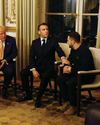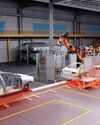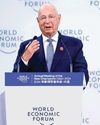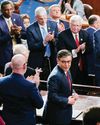
WHEN A JET CARRYING YEVGENY PRIGOZHINthe billionaire oligarch, catering tycoon, mercenary chieftain, and recent mutineer-crashed in August, the only surprise was that the interval between his June mutiny and his death was so long. But the predictability of baroque violence in Russian court politics does not make it less shocking when it actually happens.
We know very little about what goes on within the tiny inner circle of Russian President Vladimir Putin. A Kremlin spokesperson has admitted the crash could have been the result of "deliberate wrongdoing," and it is clear that so far even supposed "security experts" are just reading the same Telegram accounts as the rest of us. But the rise and fall of Prigozhin reveals many threads that run throughout Russian history and remain relevant now. It also chronicles the depletion of autocratic prestige, state power, and competent management-and thus raises the threat of the disintegration of Russia itself.
First, all of this is a symptom of one-man rule, the habitual system in Russia throughout its long history. Prigozhin was the latest in a long line of court favorites whose ascendancies are the inevitable result of personal power. Some imperial favorites were amazingly talented (Catherine the Great's co-ruler Prince Potemkin was the greatest statesman of the Romanov dynasty) and some not (Nicholas II's Rasputin was the most talentless). When these favorites lose the protection of their patrons, their falls are vertiginous.
This story is from the September 25, 2023 edition of Time.
Start your 7-day Magzter GOLD free trial to access thousands of curated premium stories, and 9,000+ magazines and newspapers.
Already a subscriber ? Sign In
This story is from the September 25, 2023 edition of Time.
Start your 7-day Magzter GOLD free trial to access thousands of curated premium stories, and 9,000+ magazines and newspapers.
Already a subscriber? Sign In

Q & A: Borge Brende
The World Economic Forum president talks with TIME editor Sam Jacobs

Q & A - Rene Haas
Arm's CEO on how his hardware is supporting the Fourth Industrial Revolution

The conflicts looming over 2025
WHEN DONALD TRUMP TOOK THE OATH OF OFFICE AS President in January 2017, his first foreign policy priority was to get tough on China. The Trump 2.0 Administration will continue that work. But when he strides back into the Oval Office in January 2025, Trump will also become responsible for U.S. management of two dangerous wars, the kinds of hot foreign policy crises he was fortunate to avoid during his first term.

Rev Lebaredian
Nvidia's vice president of Omniverse and simulation technology on training AI-powered robots

5 predictions for AI in 2025
New uses and policy questions come into focus

Roy Wood Jr. The comedian on his new stand-up special, the importance of working in food service, and learning from Keanu Reeves
8 QUESTIONS WITH Roy Wood Jr.

A call for global cooperation in the Intelligent Age
Cultivate wisdom along with innovation

The D.C. Brief
IN THE END, THE THREAT OF A FARright revolt proved more menacing than most imagined, as Republican Mike Johnson initially came up short on Jan. 3 during the first balloting to keep him as Speaker.

The digital labor revolution
OVER THE PAST TWO YEARS, WE'VE WITNESSED advances in AI that have captured our imaginations with unprecedented capabilities in language and ingenuity. And yet, as impressive as these developments have been, they're only the opening act. We are now entering a new era of autonomous AI agents that take action on their own and augment the work of humans. This isn't just an evolution of technology. It's a revolution that will fundamentally redefine how humans work, live, and connect with one another from this point forward.

Tech we can trust
Serving humanity's best interests must be at the center of progress